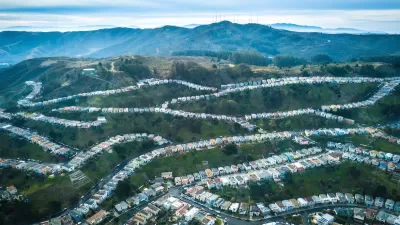Following recent bad news about the sluggish growth of the country's gross domestic product (GDP), the Brooking Institution reminds policy makers that growth does not necessarily trickle down to economic well-being.
Alan Berube follows on recent news about the sluggish national economy with data that focuses more on the economic well-being of metropolitan areas, while also producing some larger conclusions about the connections between economic growth and economic well-being.
First came the news from the U.S. Commerce Department "that GDP growth slowed to an annual rate of 0.7 percent in the fourth quarter of 2015, stoking fears about whether the ongoing recovery from the Great Recession can sustain momentum in the face of global economic instability."
Berube, however, reminds readers of the Brooking Institution's Metro Monitor tool, which allows additional insight into the economic health of the country. According to Berube, the Metro Monitor shows that 95 of the 100 largest metro areas showed increases in growth categories. "Yet growth in metro economies did not reliably improve all residents’ economic fortunes," states Berube.
To make that point Berube shares a chart laying out growth rankings and inclusion rankings, showing a weak relationship between the two categories. From that exercise, Berube produces the following findings:
Many metro areas that had high growth performed worse than their peers on inclusion, and vice versa (the upper left and lower right-hand quadrants). Nashville’s economy grew at a rapid rate from 2009 to 2014, ranking fifth among metro areas, but median wages fell and relative poverty rose. In Springfield, Mass., however, relative poverty dropped significantly, ranking the metro area second for inclusion, despite anemic overall growth that ranked the metro area 64th among the 100 largest.
The article concludes with an appeal to policy leaders to keep in mind all the measures of economic opportunity—not just the obvious—when evaluating the performance of the economy.
FULL STORY: In metro areas, growth isn't reliably trickling down

Depopulation Patterns Get Weird
A recent ranking of “declining” cities heavily features some of the most expensive cities in the country — including New York City and a half-dozen in the San Francisco Bay Area.

California Exodus: Population Drops Below 39 Million
Never mind the 40 million that demographers predicted the Golden State would reach by 2018. The state's population dipped below 39 million to 38.965 million last July, according to Census data released in March, the lowest since 2015.

Chicago to Turn High-Rise Offices into Housing
Four commercial buildings in the Chicago Loop have been approved for redevelopment into housing in a bid to revitalize the city’s downtown post-pandemic.

Chicago Awarded $2M Reconnecting Communities Grant
Community advocates say the city’s plan may not do enough to reverse the negative impacts of a major expressway.

New Park Opens in the Santa Clarita Valley
The City of Santa Clarita just celebrated the grand opening of its 38th park, the 10.5-acre Skyline Ranch Park.

U.S. Supreme Court: California's Impact Fees May Violate Takings Clause
A California property owner took El Dorado County to state court after paying a traffic impact fee he felt was exorbitant. He lost in trial court, appellate court, and the California Supreme Court denied review. Then the U.S. Supreme Court acted.
City of Costa Mesa
Licking County
Barrett Planning Group LLC
HUD's Office of Policy Development and Research
Mpact Transit + Community
HUD's Office of Policy Development and Research
City of Universal City TX
ULI Northwest Arkansas
Town of Zionsville
Urban Design for Planners 1: Software Tools
This six-course series explores essential urban design concepts using open source software and equips planners with the tools they need to participate fully in the urban design process.
Planning for Universal Design
Learn the tools for implementing Universal Design in planning regulations.




















